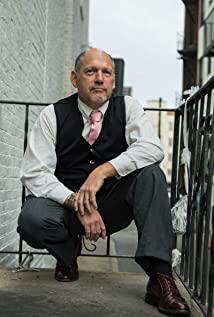The male protagonist Davis is a financial executive, handsome and rich, with a perfect life, but his face is absent-minded. Only 2 minutes into the opening, his wife died in a car accident in front of him. After losing his wife, Davis staged a series of absurd and weird behaviors, from indifferent to losing his wife, to questioning why he was indifferent, to finally realizing how much he loved, and he finally found himself from numbness. . He uses his own efforts to try to explain that sometimes we think everything will return to the "right track", but sometimes, all efforts are to jump out of the established track.
The film uses stylized behavior to accurately express an "elite" image who is detached from reality and whose behavior is numb but unknowing. Davis lives an undisturbed life. The night lights go out on time every day, and the curtains and alarm clocks are turned on at regular intervals. From the moment he opened his eyes, everything was on track today. He wears ultra-isolating headphones to block all irrelevant information, and his brain has also learned the same superb ability to process the trivial life trivia of his wife and the real details that happen every day as a humming background sound, which is not heard. , turn a blind eye. Getting up, running, showering, trimming eyebrows, shaving, taking the train to work, catching up with the progress, in this rhythm, he entered a numb inertia without knowing it, and the day after his wife died, he came to the office at the same rhythm , in the strange eyes of colleagues also feel inexplicable. Davis' habitual deadpan and perpetual indifference, paired with Hal's handsome face, makes one misunderstand that maybe he's a selfish and ruthless bastard. If there is such a man in your life, don't rush to characterize him. Maybe he is the same as in the movie, but he has a numb soul under the glossy appearance.
When it is running at high speed, it is impossible to see the appearance of the top, and when it is busy as a habit, people can't see themselves clearly, or even experience their own feelings. For some serious diseases, it is not easy to determine the location of the lesion, but if the fingertip is punctured by a needle, it is much easier to determine the location of the wound. The greater the damage, the easier it is to conceal. Davis didn't know what it meant to lose his wife at first, but he was particularly concerned about the vending machine stuck and not spitting out MM beans.
He kept writing letters to the vending machine company to complain, explaining that the machine swallowed his money but didn't drop out the MM beans, and at the same time, he talked about his life in great detail, and of course the memory of his wife was indispensable. In this long-winded nervousness, Davis's confusion was gradually revealed, and he, who had completely lost his mind about his feelings and life, began to organize himself in such an unimaginable way. His wife occasionally flashed in front of him, each with a slightly angry questioning face. When and why these impressions started, Davis had no idea at all. He attributed it all to the fact that there may be no relationship between them. Really loved it.
As an elite middle class, Davis has the life that almost every American wants, a beautiful house in the suburbs, a rising career, a beautiful and moving wife, all of which are like a perfect isolation space, outside the space is Struggling with all kinds of things in this world, in space, it is an ideal state of order. In order to maintain this state, the middle class seems to be elegant, but in fact, they have tried their best, and even overdrawn themselves. Davis has been immersed in work for a long time, immersed in a series of investment data, and immersed in the state of maintaining early to bed, early to rise, and regular exercise. The price of such self-discipline and precision in life is that he has long been numb.
Davis' father-in-law, as the real owner of wealth, has obviously jumped out of this self-inflicted class. His sorrow for losing his beloved daughter can be revealed naturally or transferred reasonably. He bought an expensive bar and said to his son-in-law with tears in his eyes: Those who have lost their parents are called orphans, but there is no word for those who have lost children. Then he quickly pinned this grief in another way. He used his daughter's assets to set up a student aid fund, and upgraded his feelings with a hypocritical but elegant tone. Although some people who seek financial aid are completely bastards, It does not affect him in this way to continue the value of his daughter. Maybe the world of wealth owners is not something we can understand, and what he wants may never be true, or they also have their own difficult to jump out of the track, forcing them. They are farther from reality.
While maintaining correspondence with Karen, the customer service of the vending company, while destructively dismembering his life, Davis dropped all manners that corresponded to his status and began to go crazy. He pulled the emergency brake on the train; he was a curious observer of the passenger's luggage at the airport, wondering what were the necessities of life; he began to discover things around him that he had seen but never cared about before: his wife wrapped around a comb The hair on his hair, the birds chirping outside the window, the small animals on the lawn, and the big tree dug up by the roadside, he said in the complaint letter: All of these are like metaphors. The film calmly borrows the protagonist's mouth to express the idea of the film itself, and makes the attentive audience smile knowingly, just like Davis who repeatedly weighed the words when writing the complaint letter. Overreading of life and self-interpretation.
This series of metaphors, like ants, gnawed at Davis' psychological dam. Starting from repairing the refrigerator that his wife had been complaining about, Davis got out of control, as his father-in-law said in "Tune-Up": If you want to repair something, you must first take it apart and find the most important point. Cultures are always strikingly similar, and isn't our culture always emphasizing that it cannot be broken or established? Thus, there was a vigorous beginning of the "broken life" in the title. From refrigerators, toilet doors, coffee makers, computers, to furniture, and even a house, Davis never returned on the way to breaking it all down. His abnormality is beyond the limit that his relatives and friends can bear. People are no longer easy to forgive him or even mock him because of his wife's death. The face of his wife that flashed before his eyes again is no longer so cold, and even has a specious smile.
His wife appeared more and more in hallucinations, and a sense of oppression that the truth was approaching made Davis begin to gasp for breath. In the real world, his unshaven beard pierced the soles of his feet, and even wore a body armor to feel the feeling of being shot. In his fantasy of seeing a doctor, he accurately described to the doctor that his whole body was numb, but he felt that a piece was missing in his heart. The doctor told him that a piece of your heart was bitten by a North American gypsy moth. This is of course a metaphor.
Then the film gave him a long shot, in the backward crowd, wearing sunglasses and earphones, slowly advancing, going against the current, whether it is advancing or retreating, it is not an easy task. The broken life still needs to be picked up piece by piece.
In this journey of dismantling of life, Davis was lucky enough to find a travel companion. The one who was interested in everything about him was the after-sales service of the vending machine company. In fact, it was Karen, the live-in girlfriend of the company owner, and Karen's son. As the bottom layer of society who cannot help themselves, they are also in a predicament. In order to move closer to a normal life, they numb their feelings. Karen suffers from a boss she doesn't love, and Karen's son suffers from the confusion of his own sexuality choice. A strange magnetic field is created between these three people, supporting and encouraging each other to get closer to their truest selves. Davis is doing inexplicable things with them. In the eyes of outsiders, he is becoming more and more indulgent and crazy, but his delusional wife begins to smile like flowers. The sweet past between the two gradually emerges. Davis is in love. Crying out of the feeling. Until then, the audience suddenly realized that, like Davis, we never knew that his love for his wife was hidden in such a deep place and had such a weight.
Under the influence of Davis, Karen left her boss boyfriend who she didn't love at all. Karen's son finally saw the fact that he was gay, and even his father-in-law and mother-in-law found a better way to express their emotions. Everyone Re-examined his life to varying degrees. Audiences, like us, will inevitably be tempted to examine themselves, whether they are still continuing the work they don’t like, why they haven’t had the courage to end that boring love, why they are always consumed by material things, and why they need other people’s ideas so much To support the ego, in modern society, to keep the track, seems to have unconsciously become an instinct, and in this non-primitive instinct, the heart is still as fragile and brave as it was at first.
By the end of the film, Davis is back to his normal life and everything is back on track, but this time at a rhythm he controls, naturally waking up and jogging in the sun. After losing the love and finding the self, if life is destined to be so fragmented, maybe all we can do is slow down from time to time, look back and wait for the souls who are not willing to give up.
View more about Demolition reviews











